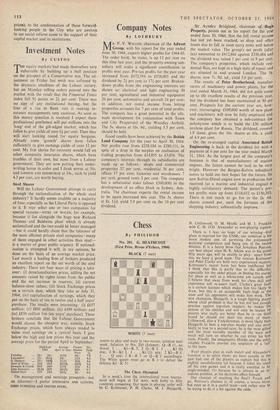Investment Notes
By CUSTOS
"rim equity markets had made themselves very I vulnerable by building up a bull position on the prospect of a Conservative win. The ad- justment on Friday last week was softened by the dramatic smallness of the Labour victory, but on Monday selling orders poured into the Market with the result that the Financial Times index fell 9+ points or 2f per cent. There was no sign of any institutional buying, but the fear of a rise in Bank rate is making in- surance managements very cautious. As soon as this money question is resolved I expect these professional gentlemen will put millions into the 'long' end of the gilt-edged market, which has fallen to give yields of over 61 per cent. Then they will start looking round for equity bargains. Already some 'growth' shares have fallen sufficiently to give earnings yields of over 12 per cent. My first choice for recovery would fall on select composite insurance shares, which have troubles of their own, but none from a Labour government. They are now putting their under- writing house in order and I think ROYAL at 36s. and LONDON AND EDINBURGH at 34s., each to yield 4.3 per cent, are worth buying.
Steel Shares
Will the Labour Government attempt to carry through the nationalisation of the whole steel industry? It hardly seems credible on a majority of four, especially as the Liberal Party is opposed to it. It may select one or two companies for special reasons-STEEL OF WALES, for example, because it lies alongside the huge new Richard Thomas and Baldwins plant which is already nationalised and the two could be better managed -but it could hardly claim that the takeover of the most efficient private steel companies--many of them engaged in other activities than steel- is a matter of great public urgency. If national- isation is attempted it will, in my opinion, be done on the basis of an average market price. Last month a leading firm of brokers produced an excellent report on the net worth of the steel industry. There are four ways of pricing a take- over: (i) denationalisation prices, adding the net amounts raised by rights issues from the public and the net increase in reserves; (ii) current balance-sheet values; (iii) Stock Exchange prices on a certain date, which they take as July 31, 1964; (iv) capitalisation of earnings, which they put on the basis of ten to twelve and a half years' purchase. The results were interesting: (i) £657 million; (ii) £841 million; (iii) £499 million; and (iv) £850 million (on ten years' purchase). These brokers conclude that the Labour Government would choose the cheapest way, namely, Stock Exchange prices, which have always tended to value steel earnings on a cynical basis. I give below • the high and low prices this year and the average price for the period April to September:
High/ Low 1964 Average Present April to Sept. Market Price Div. Yield `,'"; Colvilles 38/- 26/- 31/01 30/- 7.8 Lancashire ... 27/-
24/- 23/3 8.4 S. Durham ... 27/- 20/14 14/ 21/2 2016 9.6
Steel of Wales
25/6 19/ 20/10I 20/71 9.6 Stewarts & Lloyds 39/6 24/9 3 1 /71 31/6 9.3
John Summers ...
138/4f 29/9 34/101 30/9 9.7 United Steel ... 37/9 23/9 30/71 30/- 9.8
On management and earnings prospects-not OD takeover-I prefer STEWARTS AND LLOYDS, JOHN SUMMERS and UNITED STEEL.


































 Previous page
Previous page